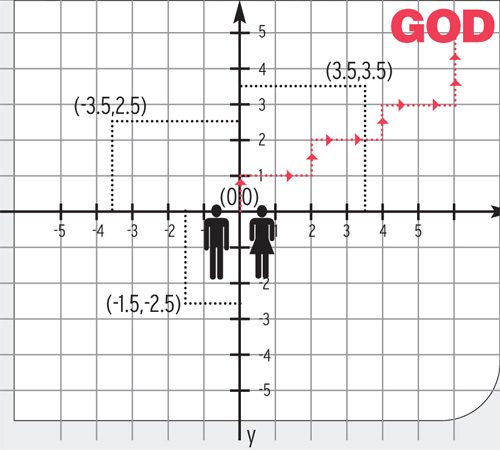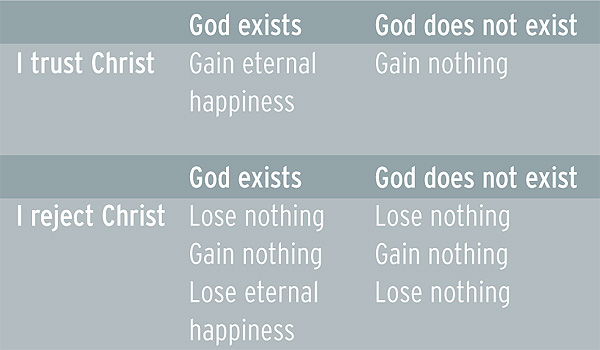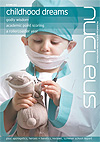rationalism, doubt and a head in an oven: Descartes (1596-1650)
Faith and rationality are often seen to be incompatible. Religion is seen as irrational, or at least unconnected to reason. God botherers must hang up their brains with their coats at the church door. Intellectual suicide is necessary for membership. Where did this idea come from? Strangely, it started when well-meaning Christians tried to prove that God existed using mere logic alone in 'the Enlightenment'. There was a desire to find a neutral method to reach consensus after the long and bloody religious wars that had ravaged and divided Europe for more than a century. Rather than start with God's revelation to man, they started with man, which has been the Western tradition ever since. Enter a Frenchman who had dabbled in medicine and then invented co-ordinate geometry in his early 20s.
To a man with a hammer every problem is a nail. Descartes' hammer was the mathematical method which he thought the best tool for everything, resolving 'never to accept for true what I did not clearly know to be such'. (1) Cartesian doubt means excluding anything about which doubt is even possible. Which includes pretty much everything. After all, don't our senses deceive us regularly? A stick looks like it is bent in water, and dreams feel real (Descartes would have loved the films The Matrix and Inception!). But it is hard to doubt that you are doubting, so doubt becomes the only fixed point for all reason. In 1690 he entered a stove (or stove-heated room) with half-baked ideas (a philosopher's little pun), and came out with the most famous conclusions of Western thought: cogito ergo sum (I think therefore I am). Many others followed Descartes' radical quest for mathematical certainty about everything. These 'rationalists' had great faith in the power of unaided reason to map reality using logical deductions. But as a result they drove a wedge between the subjective and objective, the internal world of mind and the external world that can never be known in itself. Medics will recognise this habit of splitting body and soul, brain and mind into parallel realities, called dualism. And despite Descartes' intentions, God is reduced to a necessary idea, merely there to solve the philosophical problem of how finite man can know anything; God just gives us reliable minds.
Rationalism: the view that reason, rather than experience, authority, or spiritual revelation, provides the primary basis for knowledge.
Others followed Descartes' inward journey to its logical conclusion: despair. Radical scepticism was born, rejecting any authority or reality outside the individual. It led to a downward spiral into subjectivism and existential angst. It has caused many to put their heads in ovens metaphorically and literally.

Christian sceptic: Blaise Pascal (1623-62)
But not everyone relegated God to a thought experiment. Pascal was another multitalented scientist whose work you remember every time you quote an arterial blood gas in units of kilopascals. Despite being a mathematician who developed probability theory and anticipated calculus, he was appropriately sceptical about a chain of reason that leads from man to God. It is a mistake to put ourselves at the centre of the universe:
'Whenever we think we have a fixed point to which we can cling and make fast, it shifts and leaves us behind; if we follow it, it eludes our grasp, it slips away and flees eternally before us. This is our natural state and yet the state most contrary to our inclinations. We burn with desire to find a firm footing, an ultimate, lasting base on which to build a tower rising up to infinity, (2) but our whole foundation cracks and the earth opens up into the depth of the abyss.' (3)
Pascal saw that man is not merely a 'thing that thinks' like Dr Spock, and God is more than a necessary idea:
'The God of Christians is not a God who is simply the author of mathematical truths …But the God of Abraham, the God of Isaac, the God of Jacob, the God of Christians, is a God of love and of comfort, a God who fills the soul and heart of those whom he possesses, a God who makes them conscious of their inward wretchedness, and his infinite mercy, who unites himself to their inmost soul, who fills it with humility and joy, with confidence and love, who renders them incapable of any other end than himself.' (4)
Appropriately for the leading researcher on gas pressure, he talked about a vacuum or void in the human heart that can be filled only by God. (5) If man is our starting point, let's start with something else that is beyond doubt: man's wretchedness, our sense that we are 'dispossessed kings', dislocated from our true home in God. Pascal challenged the rationalists on their naïvety about the human heart, which distorts reason: 'The heart has reasons that reason cannot know.' (6)
Ask a sceptic this: 'If I answered all ofyour questions to your satisfaction, would you become a Christian today?' They may well say no, because faith is not simply a philosophical conundrum, and doubt is often used as a defence. 'The heart is deceitful above all things and beyond cure. Who can understand it?' (Jeremiah 17:9). To become a Christian is not merely to believe true things, but to surrender our souls.
Pascal saw that rationalists had too great a faith in human reason; in fact their faith was unreasonable:
'We know the truth not only through our reason but also through our heart …We know that we are not dreaming, but however unable we may be to prove it rationally, our inability proves nothing but the weakness of our reason.' (7)
Many Christians today fall into one of two camps: one believing that conversion is a matter of the heart divorced from reason (fideism); the other that reason and persuasion defeat ignorance (evidentialism). Pascal was unusual in appealing to both head and heart. He was a towering intellect who was humble enough to admit the limitations of reason. Much like Paul, he spoke to intellectuals at the highest level, but challenged us all to look honestly into our hearts. (8) He was one of the first modern apologists, using science to commend Christ. Famously, as a founding statistician, he proposed a wager, that if faith were a bet, we have everything to gain and nothing to lose from choosing Christ.

the heart of the problem is the problem of the human heart
Yet Pascal was not naïve enough to believe that argument alone would win others to Christ. Philosophical arguments leave our hearts unmoved even when we recognise truth in them. (9) The God of the Bible sometimes hides, (10) giving enough light to draw out the true seeker, but enough obscurity to leave the hardened to their own devices. He is also a God who wants us to find him, but we must do so on his terms.
Christ is the key:
'Scripture says that God is a hidden God and that since nature was corrupted he has left men to their blindness, from which they can escape only through Jesus Christ, without whom any communication with God is broken off. "No one knows the Son except the Father, and no one knows the Father except the Son and those to whom the Son chooses to reveal him."' (11)
empiricism: seeing is believing.Or is it?
Back in Britain, a different philosophy arose called empiricism. A key leader was the Scottish philosopher, historian and librarian David Hume (1711-76). Unlike the rationalists who valued selfevident truths and logic, empiricists doubted the power of reason alone. They asserted that no ideas come to us except by experience and observation in the lab. Whereas rationalists distrusted experience, empiricists trusted only in experience.
Empiricism: the view that experience, especially of the senses, is the only source of knowledge.
Again, man was the reference point, and God would have to prove himself on man's terms. Hume took doubt to another extreme. He doubted whether reason could ever penetrate the true nature of reality, and he denied such a thing as immutable laws of nature, which are never directly observable. Yet such was his prejudice against revealed religion (based on God's revealing himself to man), Hume used these laws he couldn't defend to deny the possibility of miracles:
'A firm and unalterable experience has established these laws, the proof against a miracle is as entire as any argument from experience can possibly be imagined.' (12)
Having contradicted himself, the architect of empiricism discounted the most important observation of a miracle in history. The resurrection is the test case on which Christianity rests, but Hume was not empirical enough to assess it. He made his mind up before examining the evidence, writing that no testimony could ever establish that a miracle has occurred unless 'its falsehood would be more miraculous than the fact which it endeavours to establish'. (13)
Hume's legacy is scientism: the assumption that only sense, data and scientific method can establish truth. But this assertion is selfdefeating. After all, which experiment could possibly establish this statement? It is an article of faith unsupported by science itself.
Sydenham (1624-1689): Christian empiricist
One man who did not waste too much time in an oven or a library was the puritan Thomas Sydenham, the 'English Hippocrates'. At a time of scientific speculation and dogma in medicine, he was a keen observer: 'You must go to the bedside. There alone you can learn disease.' He had plenty to observe when he journeyed to London to treat victims of the Great Plague in 1689. His descriptions of scarlet fever, measles, malaria and of course Sydenham's chorea were written up in Opera Universa, the standard textbook of the day.
But his rise to fame was a hard one. Caught up in the Civil War, he was once left for dead, and imprisoned for nine months by Royalists. So low were the standards of the day, Sydenham was awarded a bachelor of medicine on the say-so of an earl. Thankfully his lack of formal education protected him from inheriting ancient errors. Rather than ascribing illness to imbalance of humours, he carefully observed the natural history of each, saying 'every merely philosophical hypothesis should be set aside, and the manifest and natural phenomena, however minute, should be noted with utmost exactness'. (14) He refused to lump all fevers together as one entity, and distinguished between several of them on the basis of 'peculiar and constant phenomena'. But he was more concerned with the welfare of patients than theory. He avoided blood letting, purges and complex remedies, and introduced quinine and opiates into English medicine. His approach dominated the next century and became standard across Europe.
And his advice to medical students is perhaps more relevant today than ever before:
'It becomes every man who purposes to give himself to the care of others, seriously to consider the four following things:
'First, that he must one day give an account to the Supreme Judge of all the lives entrusted to his care.
'Secondly, that all his skill, and knowledge, and energy as they have been given him by God,should be exercised for his glory, and the good of mankind, and not for mere gain or ambition.
'Thirdly, and not more beautifully than truly, let him reflect that he has undertaken the care of no mean creature, for, in order that he may estimate the value, the greatness of the human race, the only begotten Son of God became himself a man, and thus ennobled it with his divine dignity, and far more than this, died to redeem it.
'And fourthly, that the doctor being himself a mortal man, should be diligent and tender in relieving his suffering patients, in as much as he himself must one day be a like sufferer.' (15)
Rationalists
- Started with doubt
- Elevated human reason unreasonably
- Were naïve about the human condition and the motivations of the heart
- Encouraged subjectivity, scepticism and despair
Pascal
- Started with the bigger story of God and man, which makes sense of the human condition
- Refused to reduce man to a brain or God to an idea
- Used contemporary science to challengeagnostics
- Risked his reputation to preach Christ
Empiricists
- Took doubt to its logical conclusion: nihilism
- Elevated science unscientifically
- Rejected miracles from prejudice
- Did not assess Christianity empirically
Sydenham
- Treated reason and talent as a gift of Godto serve others
- Observed patients closely to improve medicalpractice, not theory
- Recognised that his patients had dignityand value because of Christ
Further reading
- To read more on Pascal, read Christianity for Modern Pagans: Pascal's Pensees Edited, Outlined, and Explained by Peter Kreeft, Ignatius 1993
- For an excellent history of faith and philosophy: Philosophy and the Christian Faith, Colin Brown, IVP 1969
































